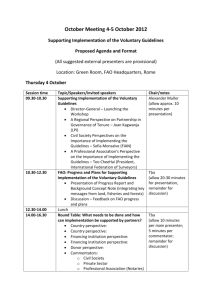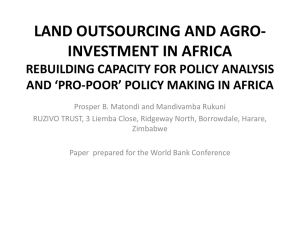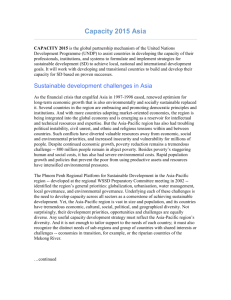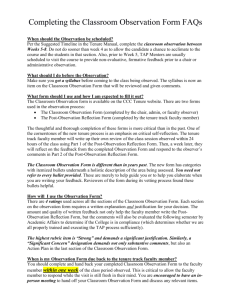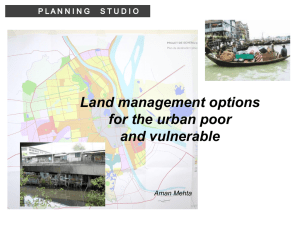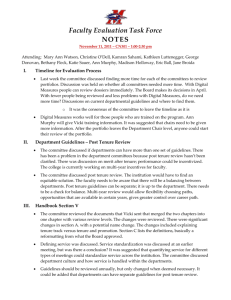Antonio-925
advertisement
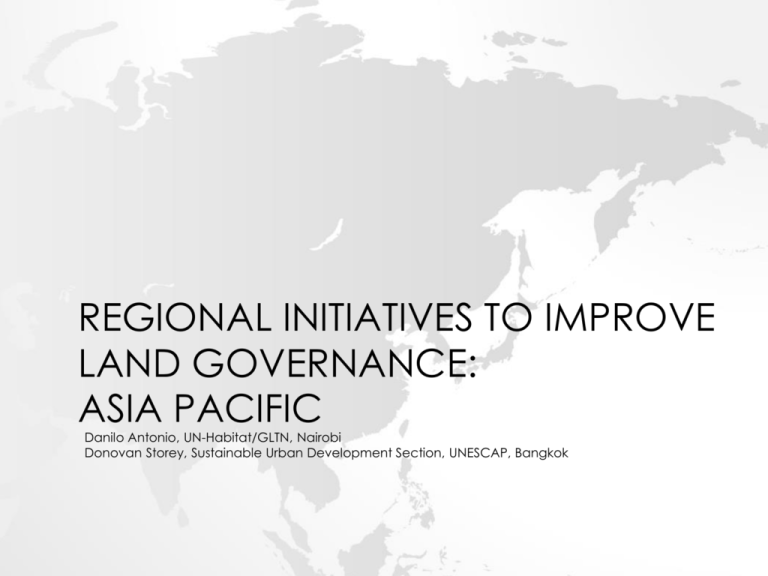
REGIONAL INITIATIVES TO IMPROVE LAND GOVERNANCE: ASIA PACIFIC Danilo Antonio, UN-Habitat/GLTN, Nairobi Donovan Storey, Sustainable Urban Development Section, UNESCAP, Bangkok 1. The Asia-Pacific region • • • • • Covering 30% of total land mass • Stretching from Turkey to Kiribati and from Russia to New Zealand Home to 2/3 of world’s population An economic success story led by urban sector Increasing level of urbanization • 2011: 13 of world’s 23 megacities • 2025: 7 of world’s 10 largest cities • Yet, largest urban population & fastest growth in smallmedium size towns & cities Some challenges: • Economic transformation with growing inequality: success underpinned by fragility • Vulnerability, risk & exposure: Asia-Pacific most affected by natural disasters • Environmental degradation & declining quality of growth – rural & urban: From deforestation, pollution to urban sprawl 2. The importance and benefits of land governance Land Governance: key to continued economic growth Challenges • Growing population, finite land resources • Land conflicts and disputes Benefits • Land as engine for food security and economic growth • Land as investment opportunity for local governments Land Governance: key to social equity Challenges • Landlessness; limited access to land and related resources by vulnerable groups • Insecurity of tenure Benefits • Empowerment, equality, peace building • Land productivity and efficiency Land Governance: key to sustainable urbanization, climate change adaptation, disaster risk reduction and resilience Challenges • • • Rapid urbanization, informal settlements Settlements and livelihoods in Low Elevation Coastal Zones Exposure to disasters and risks Benefits • Sustainable urban settlements • Risk mitigation and climate change adaptation 3. Key stakeholder roles in land governance Priorities Government • • • • Clear policies and laws Strong institutions Land reforms Service delivery Private Sector • • • Predictable business environment Clear land tenure and property rights Transparent processes Civil Society • • • Pro-poor reforms Service delivery Access to land and tenure security Who Benefits Who Loses • • • General public Government institutions Private investors • Opaque systems • Intermediaries • Land ‘professionals’ & speculators • • • Country (economic growth) Government (national and local) General public • Opaque systems • Intermediaries • Land ‘professionals’ & speculators • • • • Poor segments of society General public Government Private Sector • Landed class • Powerful elites 4. Regional quick wins and benefits from other regional experiences Quick Wins: 1. Regional platform (Land Tenure Initiative in the Asia-Pacific) 2. Knowledge management and sharing 3. Partnership building 4. Regionalizing global agenda and tools Lessons: 1. Improvements through African Land Policy Initiative 2. Involvement of regional institutions, partners and intergovernmental organizations 3. Joint programming and resource mobilization 4. Advocacy campaign 5. Regional experience and practices for improving land governance Experiences: 1. Land administration reforms 2. Improvement and equality in access to land, including vulnerable groups, women and indigenous peoples 3. Regional platforms and partnerships Practices: 1. Strengthening land governance institutions 2. Establishing inclusive laws and policies 3. Digitalizing land records 4. Enabling strong civil society groups 6. Key indicators to measure progress in improving land governance Increased number of population with secure tenure Why relevant • Tenure security particularly by women, indigenous peoples, informal settlers, small landholders will contribute to food security, poverty reduction, economic progress and sustainable urbanization How to measure • No. of people who received tenure security (not only title deeds) Improved transparency in land deals and transactions Why relevant • Large scale land acquisitions and transactions can negatively impact a large number of poor people and can create mistrust and conflict How to measure • • No. of accessible reports on public and private large-scale transactions Community/public consultation Stronger governmental focus on land and climate change issues Why relevant • Most countries in the region are affected by climate change and natural disasters. Land related policies and programmes can address these challenges and minimize vulnerability How to measure • No. of land policies, programmes and initiatives that include/mainstream climate change adaptation and mitigation 7. Regional Initiative (I) Land Tenure Initiative in the Asia-Pacific (I) • Initiated by UN-Habitat, UNESCAP and other partners in 2013 • Objectives: • Provide ‘platform for the Asia-Pacific’ • Further knowledge and discussion on regional entry points for land tenure interventions • Process: • Increasing interest (and engagement) by partners • Land Tenure Scoping Study on-going • EGM in April in Bangkok to set the future action agenda 7. Regional Initiative (II) Land Tenure Initiative in the Asia-Pacific (II) • Scoping study reflects interrelationship of securing land tenure and: • Land governance and global tools and frameworks • Climate change, disaster risk and resilience • Urban growth • Gender equality • Marginalized groups • Non-Western principles (Islamic, customary etc.) 7. Regional Initiative (III) Land Tenure Initiative in the Asia-Pacific (III) • Outlook • Create a strong regional platform in addressing land tenure issues and knowledge sharing • Strengthening regional networks and partnerships • Strengthen coordination of activity in the regional land sector • Joint programming and implementation • Benefits for the region • Awareness-raising at policy level • More coherent regional interventions and programmes • Better coordination and knowledge sharing • Prevent duplication and promote joint activities REGIONAL INITIATIVES TO IMPROVE LAND GOVERNANCE: ASIA PACIFIC THANK YOU! Danilo Antonio, UN-Habitat/GLTN, Nairobi Donovan Storey, Sustainable Urban Development Section, UNESCAP, Bangkok

